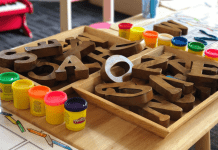
Let me affirm the power of mothering intuition by expressing you are the expert on your child. Let me also affirm that when being your child’s advocate, be mindful of a mama’s bear inability to be subjective. With two grown kids and a high school junior, I’ve learned a few things about advocating for my three children through their public-school education.
My kids are very different from each other. My advocating experiences are quite varied and have improved after three times through elementary school. Over the years, I eventually learned to successfully advocated for my children while also building collaboration with the teachers. I’ve also failed miserably at this fine balance, thus offering a chance to learn from my trial and error.
Build a Partnership
Start each school year with an attitude of appreciation for educators in general, and your child’s teacher in particular. Be available to assist and volunteer. Chaperone field trips when possible. Meet needs expressed by the teacher, such as extra tissue or hand sanitizer. Seizing opportunities to become familiar with your child’s teacher, the other students, and the learning environment helps gain insight into the context of any issues that arise.
>> RELATED READ :: 25 Favorite Parenting Podcasts <<
Ask Questions and Avoid Assumptions
When first grade pick-up began to regularly include frustration and tears, my first response was to protect my angel and defend him to the death. However, I talked myself off the ledge and took deep breathes before asking him questions about the more frequently occurring consequences. Over the course of a week or two, we brainstormed together how he might meet the classroom expectations. As his mom, I attempted to equip and empower him to avoid the consequences.
When we mother our children for the long game of becoming independent and functional adults, even issues in elementary school can teach our kids life skills.
Seek to Understand
If working with your child doesn’t yield results, or if the situation is beyond coaching your child, then approach the teacher with an attitude of seeking to understand. Assume the best from the teacher, falling back on the goal of collaboration and partnership toward the mutual goal of a success in the classroom for everyone. Stay calm, affirm your respect of the educator, and to set mutual goals and the steps to get there.
Humbly Express Yourself
The epiphany came seven years into being an elementary-school mom. Because we continued to feel public school was the right option, the only way forward was to persevere toward a solution. Thankfully, I had time to think and pray on the reported issues before the requested teacher and parent meeting, and this is where the idea was born.
Rather than walking in defensively and frustrated, I realized that a different approach might bring better results. I started the meeting by asking if I might give some perspective, noting that I had failed to offer them important insight to my child. Instead of assuming they knew what I did, I asked if they would allow me to help them understand my child so we could all work toward solutions.
>> RELATED READ :: Why You Should Join Your Child’s Parent Organization <<
I walked into that meeting with a laser focus on collaborating as a team without assumptions by means of being my child’s advocate. This allowed the teachers to be disarmed about their frustrations and brought us to common ground. I walked out feeling as though I had finally discovered a secret to advocating for my child.
Live and Learn
Freshly empowered by this success, I realized that I could build on it by offering the insights from that experience with future teachers. I began asking teachers who worked well with my children or who seemed to understand their learning style to write some tips for future teachers. Then, I either took advantage of being asked what a teacher should know about my child, or I created such an opportunity to start a new school year well.
Along the way of my stint as an elementary-school mom, my husband and I worked with our children to learn lessons and draw from their own experiences in the classroom.
This is where we formed an important family saying: No experience is wasted if there’s a lesson learned. In that spirit, I hope that my own experiences might help each of you balance being an advocate for your child with collaboration with educators.













